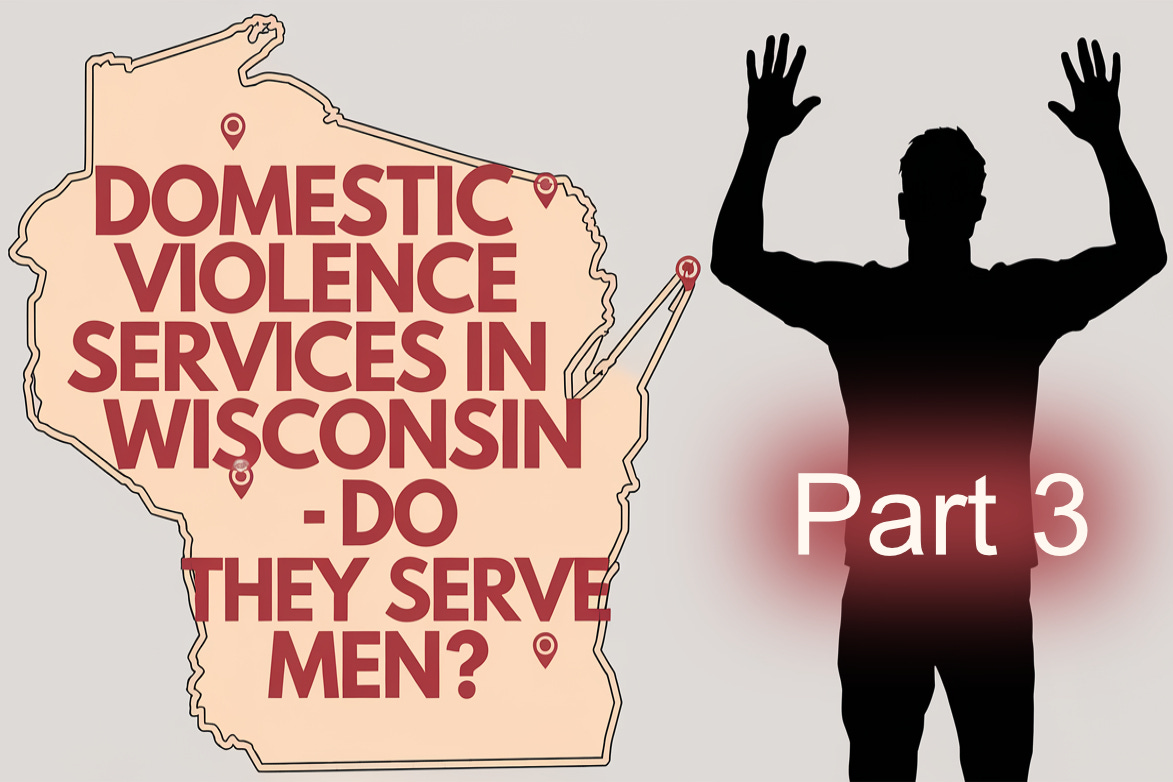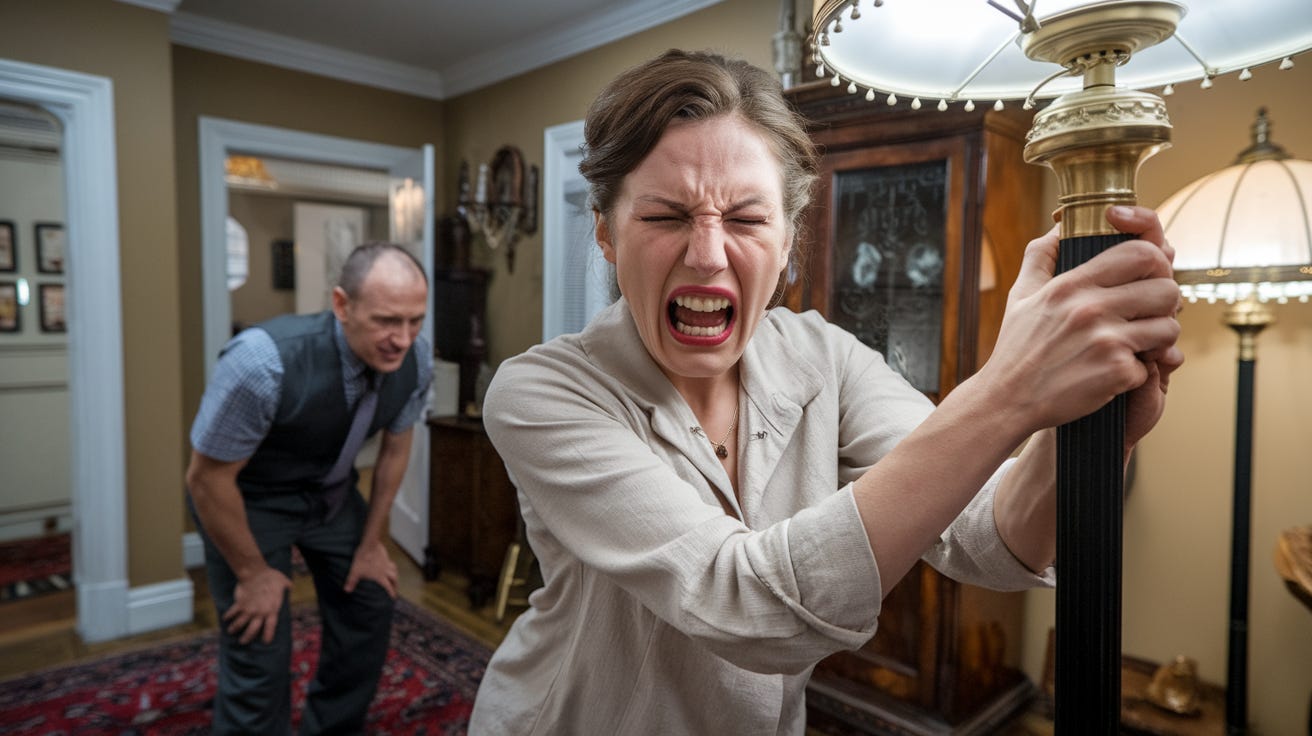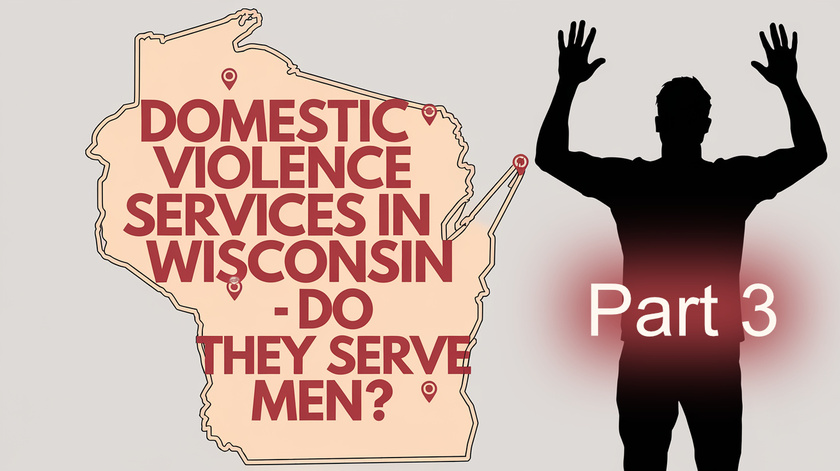This is part three of a three part series written by an anonymous gentleman who is going under the name of Daniel Carver. Daniel uses his own experience and exposes the misandry of the Wisconsin Domestic Violence system.

Part 3 – Systemic Corruption, What Can We Do About It?
I asked ChatGPT about which countries have overcome corruption in their governments. It offered this good piece of advice for common strategies to avoid government corruption:
“Common Strategies in These Countries [that have less corruption]:
Independent Institutions: Strong, impartial enforcement agencies that tackle corruption without political interference.
Transparency and Accountability: Open access to government data and information, coupled with systems that hold officials accountable.
Rule of Law: Strict adherence to the law, with well-functioning judicial systems to ensure justice.
Civic Engagement: Encouragement of public participation and a free press to monitor and report misconduct.
Ethical Leadership: Political leaders committed to maintaining integrity and leading by example.
While these countries excel in minimizing corruption, they remain vigilant and continuously adapt their strategies to maintain high standards of governance. “
-----------------------------------------------------------------------------------------------
Hopefully, our Wisconsin legislators (both state and federal) will read this series and lay awake at night wondering which one of their sons, brothers, uncles, grandsons, or men in their family could be the next one to end up spending several days in jail, tens of thousands of dollars in legal fees, assumed a wife beater regardless of any evidence or common sense; all because his wife or girlfriend attacked him in their home without any accountability or her even being questioned.
Maybe then, our state statutes will finally get fixed and public assistance money allocated fairly and justly to all citizens and taxpayers. Maybe then, the Governor’s Council on Domestic Abuse will be 50% men and announce their meetings a month in advance. Maybe then a concerned citizen, or male DV victim, could get onto their meeting agenda. Maybe the child services office would be required by law to answer a man’s plea for help for his children being beaten by their mother? Maybe our DV shelters will be required by law to provide 50% of their services to men by having DV advocates that can and do relate to the average guy?
In conclusion I want to offer some practical solutions as starting points to begin to fix these systemic problems.
First idea is the easiest one that could be implemented tomorrow at a cost of zero dollars! We would simply require every law enforcement officer, social worker, public school teacher, DV advocate employed by the state, and our state legislators to watch this free video by the leading international domestic violence expert, Dr. John Hamel. Did I mention that this would be completely free, at no cost to anyone!
John Hamel, Ph.D., LCSW - Domestic Violence Expert in the CA Court System
Second idea is for several different people around the country (men or women) to make recordings of a phone call to ask a basic question. I suggest a coordinated effort among men’s rights advocates, hopefully one in each of 50 states and each province in Canada if it is legal to record audio there. At least spread out around the US to show it is a wide spread problem. NOTE: there are possible legal ramifications of recording someone’s voice without their permission. Some states allow this and in some states it is against the law ! So first make sure that it is legal to do in your state and document the law that allows it. Each caller must live in that state to make sure they are in that legal jurisdiction. Do we have any volunteers that will commit to being the coordinator of these undercover audio recordings?

Note that is it very important to let them know at the beginning of the call that you are “NOT in an emergency situation”, that you are just calling to ask about services offered. This is a very important step, for them especially because remember you are calling a domestic violence center. We never want to give the perception that we are pretending to be in an emergency situation; that would be terribly unethical and is probably illegal in some places.
Then just ask them “I just called to ask for a friend, does your organization have a way to help men that are victims of domestic violence”? I put this in quotes because we need to have every caller that does this ask the exact same question; that’s what makes it a study and gives it more validity. Then we save all those recordings and hopefully we can compile transcripts of their answers. Then we’d have the documentation needed to get the ACLU to file a class action lawsuit against every state that participated. Do we have any lawyers that volunteer to help us build this case?
Third idea to fix systemic corruption: The minor children in a Wisconsin divorce case are assigned a Guardian Ad Litem (GAL). Those available to serve in this role are…….…mostly women. There is no requirement that these legal authorities must write out their assessment or recommendation that they give to the court who determines child custody.
Nor are the GALs legally liable to be fair and equitable to both parents! They simply go into the courtroom and make a verbal recommendation, often without even any justification of any kind, and the court almost always accepts that and acts upon that recommendation. The GAL is effectively determining child custody in lieu of the court, and does not even write any record of their recommendation or justification ! Incredible.

This is flat out systemic corruption as you would see in a communist country. We should change this, at the very least, require a written recommendation with justification. Furthermore, a summary of that GAL’s history of recommendations must be made available to the public & downloadable from a website. Names or locations of the people in the cases need not be public, but a statistical summary, per GAL, of these recommendations must be easily and readily available to those community members. The idea is to help prevent the gender bias in child custody that we all know is ubiquitous across the USA and most of the rest of the world too. I’m certain that eliminating that gender bias in courtrooms would reduce the divorce rate because every women would think twice about it if she knew that it would likely result in a true 50/50 custody arrangement.
Fourth idea is that we need a state law that requires the 35 DV shelters in Wisconsin to hire just as many straight male DV advocates as they have female DV advocates. The number of male advocates must be 95+% overall throughout the state, heterosexual. This is because 98% of the male demographic served by most DV shelters are straight men. The two most important things a DV victim needs when they ask for government assistance is a place to live for a while and an advocate that can relate to them, validates them, listens with empathy, understands them, and shares the perspective of a straight man who tried to get his wife or girlfriend to calm down and be reasonable instead of the extreme violence behind closed doors.
To understand my point better; imagine for a minute a straight woman DV victim who is beaten by her husband, runs out of her house with no other place to sleep for the night, it is -10 degrees outside, she goes to the local shelter, and a lesbian greets her at the door to invite her in to sleep there for the night!
Many Wisconsin DV shelters advertise on their website LGBQ resources available. Why don’t they also advertise STRAIGHT resources available and then provide those services too? Straight is the most common category by far (way over 90%) the bulk of the taxpayer base. If we are going to categorize everyone by their sexual orientation, then government services should be offered to all citizens and advertised in said categories, with funding proportional to their demographic category.
Fifth idea to stop the systemic corruption is the best one, yet also the most difficult to accomplish. It literally requires an act of congress. Every DV shelter in Wisconsin has a taxpayer funded Director’s position that is basically the CEO of that DV shelter. That position is always held by a woman who was appointed or just hired by the HR office. A few miles away is the local Sheriff’s office and that Sheriff had to win a public election in order to be Sheriff.
The reason for the election is because the Sheriff has immense authority and power over the general public (lethal force, and to arrest). An election is required so that if bias or corruption begins to happen in the law enforcement, the public can elect someone else that will be fair and equitable to all citizens.
What is needed is a change in Wisconsin law (statutes) that requires the Director of Domestic Violence Shelter position to be an elected official exactly like the Sheriff’s position; and for the same reasons.
The Guardian Ad Litem (GAL) positions for our children should be elected positions as well, for the same reason we elect judges.
Sixth idea to fix the systemic corruption is an organization that is set up for this very purpose regarding child custody. Mark Ludwig founded the Americans for Equal Shared Parenting, you can learn more at their website here. This organization has had some lobbying successes legislatively regarding Title-IV- D. They welcome anyone that wants to help there efforts change the systemic corruption in family courts corrected through changes in state laws.
Seventh and final idea to fix systemic corruption is more ideological. It is to get our representatives, legislators, and government official to open their eyes to the clear gender bias against men that is being considered to become legislation. We need to make phone calls and emails and speak up at town hall meetings (unfortunately these are rare). We must learn from the huge mistake make some 30 years ago when the Violence Against Women Act went into law. It was amended by the Violence Against Women Reauthorization Act of 2013. However the title is still a law that was written for women and the DV shelters continue to discriminate against men without any consequences or enforcement of the 2013 Act.

Why don’t we as a nation learn from past mistakes? In the last couple of years there has developed a political movement to request laws be written that prevent biological men from competing in women’s sports. And our legislators are drafting laws like this without any mention of preventing biological women from competing in men’s sports ! This is especially important in the K-12 and college sports because a male sports team (boys & men) is a critical part of development of male identity. Millions of men have talked about how a male sports team helped them develop into a man. Similarly with youth programs that are male only, they should be not only allowed, but encouraged and well funded because that is where we as a society grow boys into men.
A personal note on that. I was so fortunate to have our Dad continually drill into our minds that you never hit a girl. Never! And when my “Christian” wife was constantly yelling and screaming several times per day and lunging at me to try to get me to hit her so she could have me arrested; I never made contact with her or even threatened her, thanks to the values instilled in me as a boy. I was once in a karate class (as an adult) where we practiced sparring and I was paired with an adult lady. It was so strange to me to imitate or pretend I was going to punch or kick her.
So with boys contact sports teams, football, soccer, basketball, baseball, wrestling, lacrosse…… the list goes on……… when we put girls on the field to compete with boys; we are teaching the boys to be rough with the girls! This is a bad idea to say the least.
So when we write laws about male and female sports teams being gender segregated; we should write them for both genders, not bias toward only protecting women and girls teams. Men and boys need the dignity of competing with their own gender too.
Most recently, we saw the same mistake happen yet again in a bill that passed our House of Congress; the Violence Against Women by Illegal Aliens Act. What? Illegal aliens committing violence against men is somehow acceptable or automatically not a concern?
Already many men in the US have been victims of illegal alien’s violence; one happened just yesterday as I’m writing this, a man was shot twice in the face. When a truck blasts into a crowd, there are men there. When an explosion happens, it impacts both men and women. So why in the world would congress pass yet another law that protects only women? Did they not learn from the first Violence Against Women Act 30 years ago that had to later be amended? Incredible!
Calling for reforms to achieve true justice for all, especially our vulnerable children who need their dad,
Sincerely, Daniel Carver (pen name)
Copy to some of our reps who voted concerning the federal law: Violence Against Women Act (VAWA):
Wisconsin Senator Tammy Baldwin (202) 224-5653 141 Hart Senate Office Building Washington, DC 20510
------------------------------------------------
Wisconsin Senator Ron Johnson (202) 224-5323 328 Hart Senate Office Building Washington, DC 20510
-------------------------------------------------



















